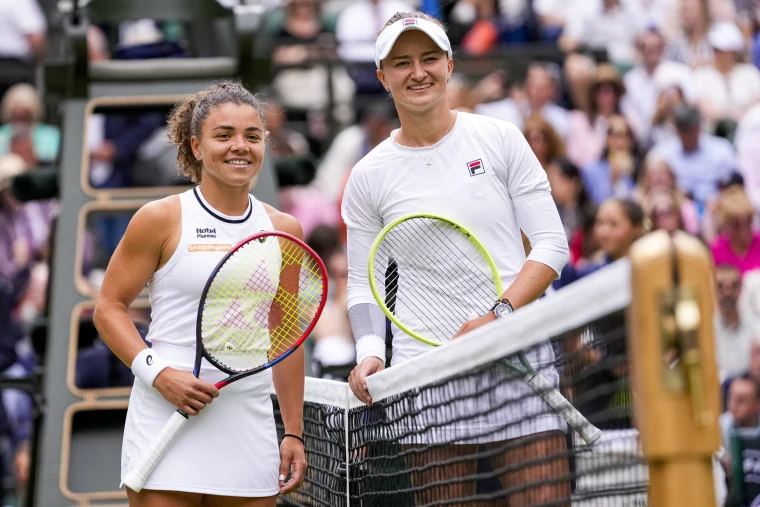Unexpected Statements from Jasmine Paolini About Barbora Krejcikova

Barbora Krejcikova took her place on the baseline on Wimbledon’s Center Court when she had a chance to break serve at 5-4 in the middle of a tight third set. As a last resort to control his nerves, he blew on the handle of his racket and hit the ball several times. At that moment, he was following in the footsteps of his mentor, the late Jana Novotna, who had experienced great hopes and disappointments on this field in the past. Novotna lost to Steffi Graf in 1993, but regained her courage by defeating Nathalie Tauziat in 1998.
Which of these two historical moments would Krejcikova’s fate resemble?
That day would be either victory or tragedy for Krejcikova, after three sets lasting nearly two hours with her tough opponent Jasmine Paolini. The 28-year-old Czech tennis player was full of self-confidence and intelligence like a veteran as he reached his first Wimbledon final. He quickly completed the first set, beating Paolini 6-2; He successfully executed most of his serves, effortlessly won points with his forehand across the court, and carried his game with effective simplicity. Contrary to expectations, the usually calm Krejcikova disrupted the peace of the sacred court with sounds of encouragement.
But while she held the momentum, Krejcikova unexpectedly slowed her game down. Instead of a powerful two-handed backhand, he sent the ball hesitantly and loosely into the net. Instead of the points he should have won with his forehand, he hit the ball late and swung it. Worst of all, his first serve slowly failed him.
Paolini, on the other hand, quickly seized the opportunity, increased his serve percentage, won points on the grass with his forehands, and dominated the game by emerging from the enthusiastic crowd. With his favorites continuing throughout the tournament and throughout the summer, Paolini made a great comeback in the semi-finals after losing the first set to Vekic and reached the final.
Krejcikova and Paolini started the third set knowing there would never be another time they would come this close to the Wimbledon title.
They both quickly adapted to the situation and played an excellent game. While Krejcikova revived her serve at the necessary moments, Paolini continued her aggressive play.
One of the turning points of the match came when Krejcikova was serving at the beginning of the third set. Paolini, who lost the first set, opened the set by serving, and it was a matter of curiosity whether he would advance towards the final with the support of the audience. However, Paolini’s over-aggressive play during the set change and a simple backhand shot out gave Krejcikova confidence again. Krejcikova won the game with an ace and two service winners, losing only one point in subsequent service games and scoring two more aces.
Another critical moment came when Paolini served at 3-3. At this moment, when Krejcikova found her forehand form and got two break points, Paolini’s first serve at the T line went out narrowly and was faulty after the challenge. This was Paolini’s only double fault of the match and gave Krejcikova a critical advantage.
In the last service game, Krejcikova lost her nerves, just two points away from the title. He started with a nasty double fault, followed by two long backhands, making it easy for Paolini to get the ball back and win the points.
Krejcikova took her place on the baseline, took a deep breath as she held the handle of the racket, and tried to relieve her stress by hitting the ball on the ground. However, at that moment he was not fighting for the championship, but at a critical moment.
About these pressured moments, Krejcikova shared the following: “I constantly told myself, ‘Make the first serve successfully, show your game and be brave.'”
No matter how tough the situation, he was ready to bounce back.
“If things don’t go the way I expect, we play long sets and the match doesn’t end easily,” she added. “The game goes on. I was prepared for both possibilities.”
Krejcikova was a reflection of the courage shown by Jana Novotna in 1998. She parried a match point as she continued her approach with a powerful forehand and then saved another with a tough forehand that landed on the outside line. On the third championship point, she held on to her first serves until Paolini’s return kick went off the court.
“I really didn’t know where this tournament would take me,” said Krejcikova, who had five aces and 14 winners in the deciding set. “It was a very tough series of matches from the first game. I took each match step by step. I started to feel better and my game was improving.”
Krejcikova became the surprise Wimbledon women’s champion for the third consecutive year, following the victories of Elena Rybakina in 2022 and Marketa Vondrousova in 2023. If Iga Swiatek and Aryna Sabalenka continue their dominance on grass courts, it could last for the foreseeable future at the sport’s most prestigious tournament.
However, if the finals are this exciting and can affect the audience this much, it becomes irrelevant how unexpected the results are.


